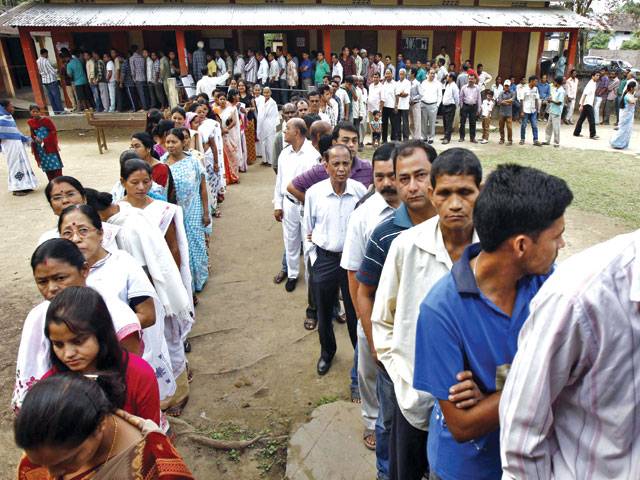DIBRUGARH, India - Indians began voting Monday in the world’s biggest election, which is set to sweep the Hindu nationalist opposition to power at a time of low growth, anger over corruption and warnings about religious unrest.
The 814-million-strong electorate is forecast to inflict a punishing defeat on the Congress party after its decade-long rule and elect the Bharatiya Janata Party (BJP) led by conservative hardliner Narendra Modi.
The first voting was held in six constituencies in India’s northeast, part of a gruelling nine-phase contest winding up May 12.
Turnout was near 73 percent in tea-growing Assam state, where separatist militancy is rife, and 84 percent in Tripura, latest official figures showed.
“I want the government to reduce poverty and do something for the future of my children,” said tea plantation worker Santoshi Bhumej, 30, at a polling station in Assam’s Dibrugarh city.
Dense queues of men and women shuffled slowly into tightly guarded booths to press the button for their candidates on electronic voting machines.
The voting began after a bad-tempered campaign hit new heights of rancour. Simmering religious tensions in the campaign, which has mostly focused on development, flared into the open late last week, when a top Modi aide was accused of inciting communal violence.
Amit Shah faces a judicial probe after reportedly telling voters in a riot-hit north Indian region to see the election as “revenge” against a “government that protects and gives compensation to those who killed Hindus”.
Rahul Gandhi, leading the Congress into his first national election as scion of the famous dynasty, said Sunday a BJP victory would threaten India’s officially secular fabric. “Wherever these people (the BJP) go they create fights. They’ll pit Hindus and Muslims against each other,” Gandhi said. The BJP said talk of “revenge” was normal ahead of an election and insisted the remarks were taken out of context. Prime ministerial front-runner Modi, son of a tea seller, is a polarising figure whose rule as chief minister of prosperous Gujarat state has been clouded by deadly anti-Muslim riots that erupted in 2002.
Releasing Monday the party’s delayed manifesto which mixed promises of development and protection of Hindu interests, Modi promised to lift the nation’s mood.
“The country has become stagnant. It is drowned in pessimism. It needs momentum to move forward,” he said. He urged voters to give him a clear majority in the 543-seat parliament. Surveys have predicted the BJP will need coalition partners when results come May 16.
In Assam, a Congress stronghold, some disgruntled voters told AFP they were swayed by Modi’s promises of better infrastructure, strong leadership, jobs and a clean administration. “Modi will give us a corruption-free government,” Deepa Borgohain told AFP as she complained bitterly about price rises during Congress’s rule.
Over the last decade, annual growth has averaged 7.6 percent, but inflation has also been high and a sharp economic slowdown which struck in 2012 has crippled public finances and investment. Coupled with widespread perception that Premier Manmohan Singh’s second term was largely lost to indecision and scandal, Modi has tapped into a groundswell of discontent.
The election will be the biggest in history and is a mind-boggling feat of organisation as voters travel to nearly a million polling stations.
Such is India’s population growth that 100 million people have joined electoral rolls since the 2009 vote.
Modi, despite at 63 being two decades older than Gandhi, is seen scoring strongly among young voters thanks to his development and good governance pledges. Over half of India’s population is under 25.
“He (Rahul Gandhi) was born with a golden spoon whereas I grew up selling tea on railway platforms. He has a well-known lineage whereas I am honest,” Modi told a rally Monday.
The left-leaning Congress’s pitch of more welfare handouts is seen at odds with India’s growing and increasingly aspirational middle class.
India under the yoga-loving Modi would likely pursue a more muscular foreign policy at a time when it is leading the developing world on issues from climate change to global trade.
But many observers worry about Modi’s impact on religious harmony in the country where 13 percent of the 1.2 billion population is Muslim.
Modi is steeped in a Hindu nationalist ideology which is often antagonistic towards Muslims and he remains tainted by the 2002 Gujarat riots.
At least 1,000 people, mostly Muslims, died in a spasm of violence shortly after he became Gujarat chief minister, leading US and European governments to boycott him for over a decade.
Modi has never been found guilty of any wrongdoing despite many investigations but a woman he appointed as minister was jailed for life in 2012 for orchestrating some of the worst violence.
Saturday, April 20, 2024
India voters kick off world’s biggest election

Caption: India voters kick off world’s biggest election
Sindh IGP chairs meeting on foreigners’ security
April 20, 2024
15-kg heroin worth Rs200 million seized in Khairpur
April 20, 2024
Youth killed by robbers in Shikarpur
April 20, 2024
BISP cash disbursement centre set up in Ratodero
April 20, 2024
A Tense Neighbourhood
April 19, 2024
Dubai Underwater
April 19, 2024
X Debate Continues
April 19, 2024
Hepatitis Challenge
April 18, 2024
IMF Predictions
April 18, 2024
Kite tragedy
April 19, 2024
Discipline dilemma
April 19, 2024
Urgent plea
April 19, 2024
Justice denied
April 18, 2024
AI dilemmas unveiled
April 18, 2024
ePaper - Nawaiwaqt
Advertisement
Nawaiwaqt Group | Copyright © 2024





